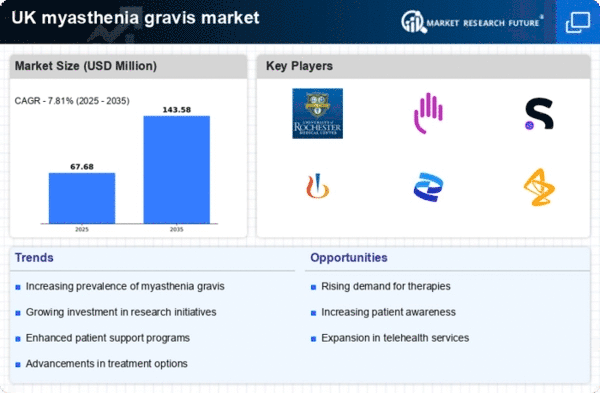Government Initiatives and Funding
Government initiatives and funding play a crucial role in shaping the myasthenia gravis market. In the UK, various health authorities are allocating resources to improve diagnosis and treatment options for neuromuscular disorders, including myasthenia gravis. Increased funding for research projects and public health campaigns is likely to enhance awareness and accessibility of treatments. Such initiatives may lead to the development of comprehensive care programs that address the multifaceted needs of patients. Consequently, the myasthenia gravis market stands to benefit from these supportive measures, which aim to improve patient care and outcomes.
Rising Incidence of Myasthenia Gravis
The myasthenia gravis market is experiencing growth due to the rising incidence of the disease in the UK. Recent estimates suggest that the prevalence of myasthenia gravis is approximately 20 cases per 100,000 individuals. This increasing number of diagnosed patients is likely to drive demand for effective treatment options. As awareness of the condition grows among healthcare professionals and the public, more individuals are being diagnosed, which in turn fuels the market for therapies and supportive care. The myasthenia gravis market is thus positioned to expand as healthcare systems adapt to meet the needs of this growing patient population.
Advancements in Research and Development
The myasthenia gravis market is significantly influenced by advancements in research and development. Pharmaceutical companies are investing heavily in innovative therapies, including monoclonal antibodies and immunotherapies, which have shown promise in clinical trials. For instance, recent developments in the UK have led to the approval of new treatment options that target specific pathways involved in the disease. This influx of novel therapies is expected to enhance treatment efficacy and improve patient outcomes, thereby stimulating growth in the myasthenia gravis market. The ongoing research efforts indicate a robust pipeline of potential treatments that could reshape the therapeutic landscape.
Growing Demand for Personalized Medicine
The myasthenia gravis market is witnessing a shift towards personalized medicine, which is becoming increasingly relevant in the treatment of chronic conditions. Patients are seeking tailored therapies that consider their unique genetic and phenotypic profiles. This trend is prompting pharmaceutical companies to develop targeted therapies that are more effective and have fewer side effects. The myasthenia gravis market is likely to evolve as healthcare providers adopt personalized approaches to treatment, enhancing patient satisfaction and adherence. This growing demand for individualized care may also drive innovation and competition among drug manufacturers.
Increased Collaboration Among Stakeholders
The myasthenia gravis market is benefiting from increased collaboration among various stakeholders, including healthcare providers, researchers, and patient advocacy groups. Such partnerships are fostering a more integrated approach to managing the disease, which is essential for improving patient outcomes. Collaborative efforts are leading to the sharing of knowledge and resources, which can accelerate the development of new therapies and enhance patient education. The myasthenia gravis market is likely to see positive impacts from these collaborations, as they promote a holistic understanding of the disease and encourage comprehensive care strategies.
















